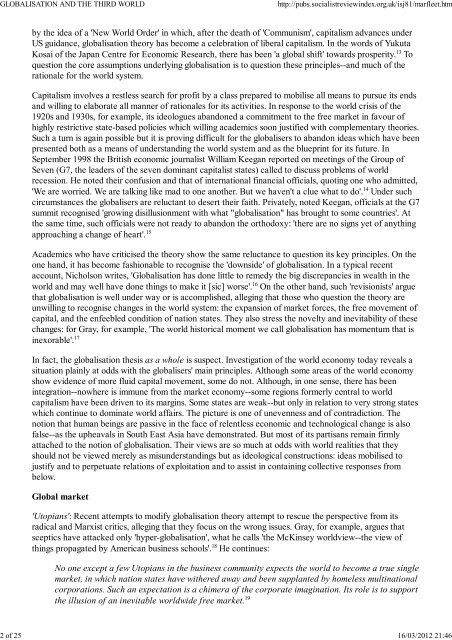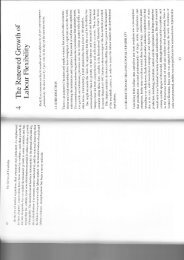GLOBALISATION AND THE THIRD WORLD.pdf - Steerweb.org
GLOBALISATION AND THE THIRD WORLD.pdf - Steerweb.org
GLOBALISATION AND THE THIRD WORLD.pdf - Steerweb.org
Create successful ePaper yourself
Turn your PDF publications into a flip-book with our unique Google optimized e-Paper software.
<strong>GLOBALISATION</strong> <strong>AND</strong> <strong>THE</strong> <strong>THIRD</strong> <strong>WORLD</strong>http://pubs.socialistreviewindex.<strong>org</strong>.uk/isj81/marfleet.htm2 of 25 16/03/2012 21:46by the idea of a 'New World Order' in which, after the death of 'Communism', capitalism advances underUS guidance, globalisation theory has become a celebration of liberal capitalism. In the words of YukutaKosai of the Japan Centre for Economic Research, there has been 'a global shift' towards prosperity. 13 Toquestion the core assumptions underlying globalisation is to question these principles--and much of therationale for the world system.Capitalism involves a restless search for profit by a class prepared to mobilise all means to pursue its endsand willing to elaborate all manner of rationales for its activities. In response to the world crisis of the1920s and 1930s, for example, its ideologues abandoned a commitment to the free market in favour ofhighly restrictive state-based policies which willing academics soon justified with complementary theories.Such a turn is again possible but it is proving difficult for the globalisers to abandon ideas which have beenpresented both as a means of understanding the world system and as the blueprint for its future. InSeptember 1998 the British economic journalist William Keegan reported on meetings of the Group ofSeven (G7, the leaders of the seven dominant capitalist states) called to discuss problems of worldrecession. He noted their confusion and that of international financial officials, quoting one who admitted,'We are worried. We are talking like mad to one another. But we haven't a clue what to do'. 14 Under suchcircumstances the globalisers are reluctant to desert their faith. Privately, noted Keegan, officials at the G7summit recognised 'growing disillusionment with what "globalisation" has brought to some countries'. Atthe same time, such officials were not ready to abandon the orthodoxy: 'there are no signs yet of anythingapproaching a change of heart'. 15Academics who have criticised the theory show the same reluctance to question its key principles. On theone hand, it has become fashionable to recognise the 'downside' of globalisation. In a typical recentaccount, Nicholson writes, 'Globalisation has done little to remedy the big discrepancies in wealth in theworld and may well have done things to make it [sic] worse'. 16 On the other hand, such 'revisionists' arguethat globalisation is well under way or is accomplished, alleging that those who question the theory areunwilling to recognise changes in the world system: the expansion of market forces, the free movement ofcapital, and the enfeebled condition of nation states. They also stress the novelty and inevitability of thesechanges: for Gray, for example, 'The world historical moment we call globalisation has momentum that isinexorable'. 17In fact, the globalisation thesis as a whole is suspect. Investigation of the world economy today reveals asituation plainly at odds with the globalisers' main principles. Although some areas of the world economyshow evidence of more fluid capital movement, some do not. Although, in one sense, there has beenintegration--nowhere is immune from the market economy--some regions formerly central to worldcapitalism have been driven to its margins. Some states are weak--but only in relation to very strong stateswhich continue to dominate world affairs. The picture is one of unevenness and of contradiction. Thenotion that human beings are passive in the face of relentless economic and technological change is alsofalse--as the upheavals in South East Asia have demonstrated. But most of its partisans remain firmlyattached to the notion of globalisation. Their views are so much at odds with world realities that theyshould not be viewed merely as misunderstandings but as ideological constructions: ideas mobilised tojustify and to perpetuate relations of exploitation and to assist in containing collective responses frombelow.Global market'Utopians': Recent attempts to modify globalisation theory attempt to rescue the perspective from itsradical and Marxist critics, alleging that they focus on the wrong issues. Gray, for example, argues thatsceptics have attacked only 'hyper-globalisation', what he calls 'the McKinsey worldview--the view ofthings propagated by American business schools'. 18 He continues:No one except a few Utopians in the business community expects the world to become a true singlemarket, in which nation states have withered away and been supplanted by homeless multinationalcorporations. Such an expectation is a chimera of the corporate imagination. Its role is to supportthe illusion of an inevitable worldwide free market. 19




